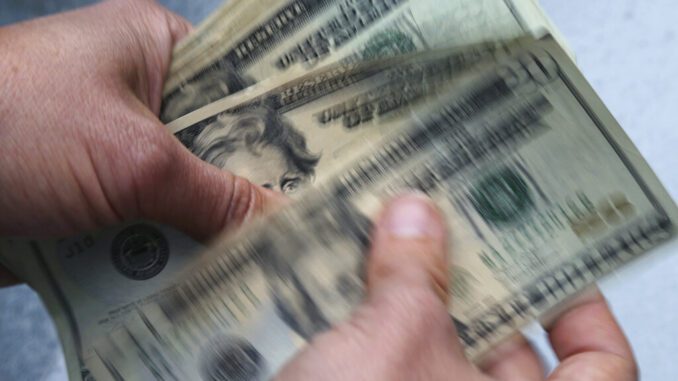
Year after year, inflation tops the list of buzzwords. You’ll notice its effects when you realize you’re receiving less value for your dollar or suddenly need to adjust your budget to make ends meet. Inflation reached a 40-year high of 9% in 2022, causing Americans to spend more on rent, milk, gas, and food.
Elena Jones, credit and personal finance expert and founder of Finance Jar, explains the current level of inflation indicates the economy is too hot and the manufacturing industry is unable to keep pace. This situation results in a shortage of services and goods.
The Value of the Dollar
Over the years, inflation has impacted the value of the dollar. For example, in 2020, two dollars could buy a gallon of fuel, but today, you need closer to six dollars to purchase the same amount of fuel.
That’s a 100% price difference and a 200% price increase in just two years. You’re getting a gallon of gasoline in 2022 for the same amount you would pay for three gallons in 2019. That’s a significant loss due to inflation.
This scenario varies in everything you buy, from gas to groceries, taxes included. Things get more challenging if your income – like most Americans – doesn’t increase at a similar rate. Inflation has a trickle-down effect and affects every part of our lives that depend on money. Aside from decreasing its value over time, inflation also affects the dollar in other ways.
Impact on Investments, Savings, and Retirement
According to Michael Ryan, a retired financial planner, and finance coach, another way to think about the dollar’s value is in terms of investment or savings. Inflation, he claims, can reduce the value of your investment or savings because the money you save will be worth less in the future. As a result, he says your retirement savings may not have as much money as anticipated.
He explains from his professional experience the effects of inflation on investments and savings are especially evident when running Monte Carlo and “what-if” scenarios in financial planning software programs. “You can run simulations of many different scenarios,” he continues, “and an increasingly inflationary environment destroys more retirement plans than any other scenario.”
Like fixed-income investments, bonds experience price drops in response to inflation because their interest rates typically remain constant until maturity. As a result, an increase in inflation reduces the value of interest payments. Therefore, asset returns for investors must exceed inflation. If not, despite showing gains, the investments are losing money.
The Strength of the Dollar Against Other Currencies
However, the news is good when comparing the dollar to other currencies. Inflation may have positively impacted the dollar. According to Bloomberg, the U.S. dollar had been soaring – now up 7% for the year. Unfortunately, as many experts predict, this could soon go in the other direction.
Ryan agrees. He observes that the dollar continues to strengthen against all other currencies, in contrast to how the dollar is declining at the grocery store – a strategy employed by the federal reserve in an attempt to mitigate inflation.
But, according to the financial coach, while the dollar is currently strong, it may cause problems in the future and be detrimental to the U.S. economy. He warns this could lead to a rise in U.S. goods, a drop in demand and exports, and a possible recession.
He also states that a strong dollar may cause further inflation by making certain goods more expensive. The financial coach admits it is difficult to predict the long-term consequences of the dollar’s recent strength. However, should it continues to rise, Ryan believes it will eventually cause problems for the U.S. economy.
Taxes and Interest
Inflation also significantly determines tax policies, which have a complex interaction with inflation and the broader economy. For example, consumers must pay more taxes to get the same amount of food.
“If you pay 6% state or local tax, and you purchase an item that used to cost $100 ($6 tax), it now likely costs $200, plus $12 in taxes,” Michael explains. He notes that the same thing happens to retirement investment income which gets taxed at a higher rate as inflation increases.
The Federal Reserve has recently raised interest rates by .75 percent. While the intent is to keep inflation under control, it will also impact the economy. According to Ryan, higher interest rates make it more expensive for businesses to borrow money, which can slow economic growth.
In addition, the stock market may dip when interest rates increase as investors are less likely to take risks when they can make more money elsewhere. Joel Hu is a course creator, research analyst, and founder of Inflation Training. Hu projects the increase may cause federal bankruptcy when interest payments are due.
However, he believes it may also force the Fed to lower interest rates to reduce the debt load. If federal tax revenues go into paying off interests, that may leave little or no money left over for the military, social security, and other welfare needs.
The Bottom Line
According to Hu, two problems associated with inflation stem from people’s reactions to exponential inflation (when it exceeds 5%) and the government’s tool for controlling inflation. He points out that most of the strategies implemented have had little to no impact on inflation.
To protect yourself from inflation, Elle Kaplan, CEO of LexION, recommends devising a plan in which you automate savings to pay yourself first, allowing you to begin saving and investing.
Furthermore, Kaplan believes stocks are suitable investments, despite their short-term volatility. Even so, “in the longer terms, stocks are a good hedge against inflation,” she explains.
Hu also admits that, besides stocks, the only asset classes worth investing in during times of high inflation are commodities and real estate.
Although it has drawbacks, a steady rate of inflation indicates a strong economy and benefits the dollar if supply and demand grow in lockstep.
